牛津深圳版英语七年级下Module 4 Colourful life Unit 8 From hobby to career同步学案及练习(含答案)
文档属性
| 名称 | 牛津深圳版英语七年级下Module 4 Colourful life Unit 8 From hobby to career同步学案及练习(含答案) | 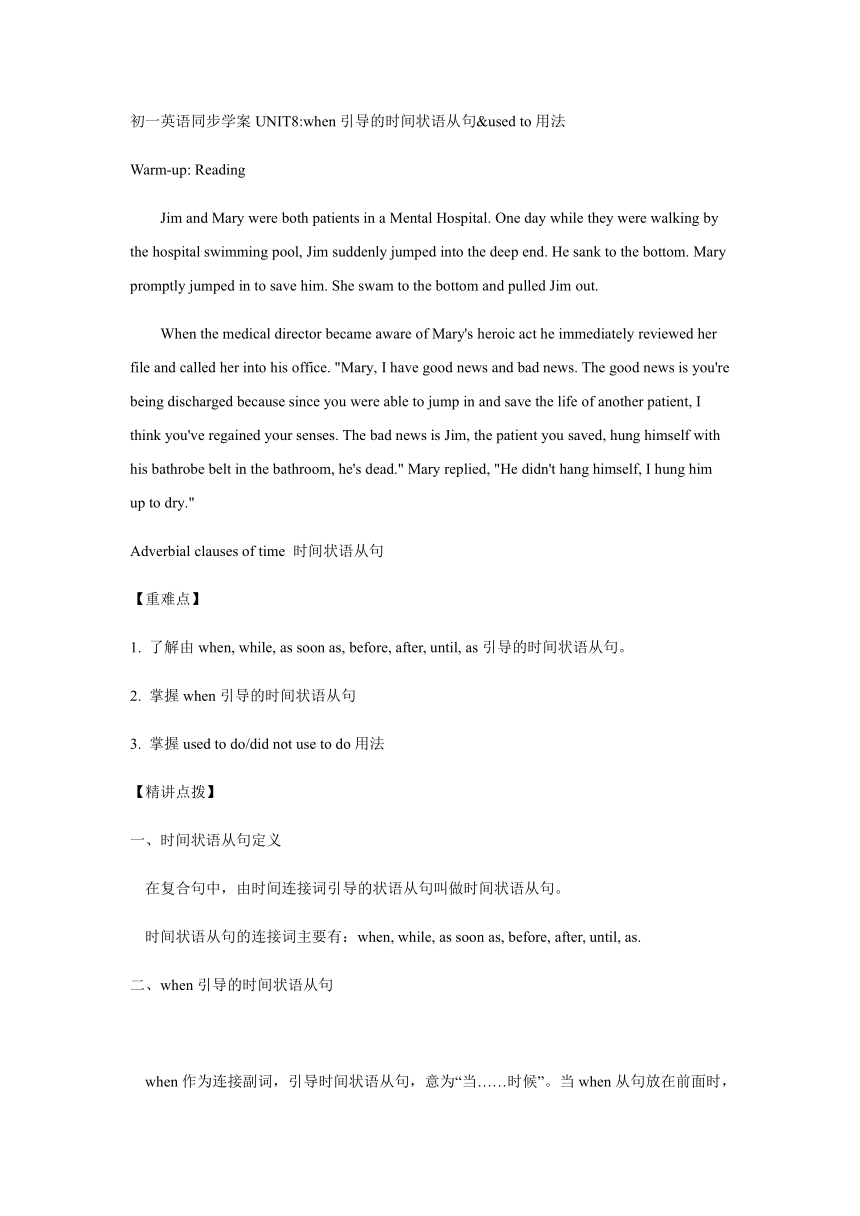 | |
| 格式 | zip | ||
| 文件大小 | 77.5KB | ||
| 资源类型 | 教案 | ||
| 版本资源 | 牛津深圳版 | ||
| 科目 | 英语 | ||
| 更新时间 | 2020-05-12 00:06:58 | ||
图片预览

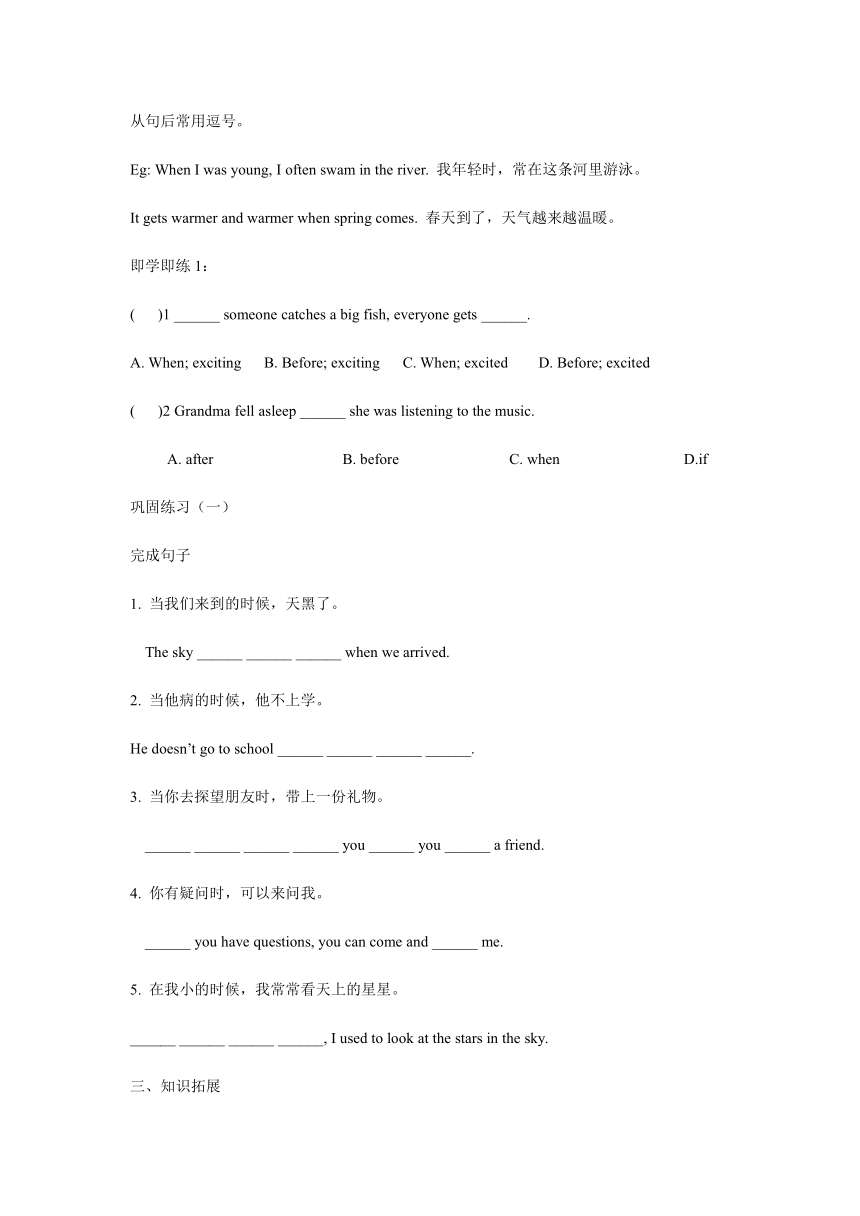
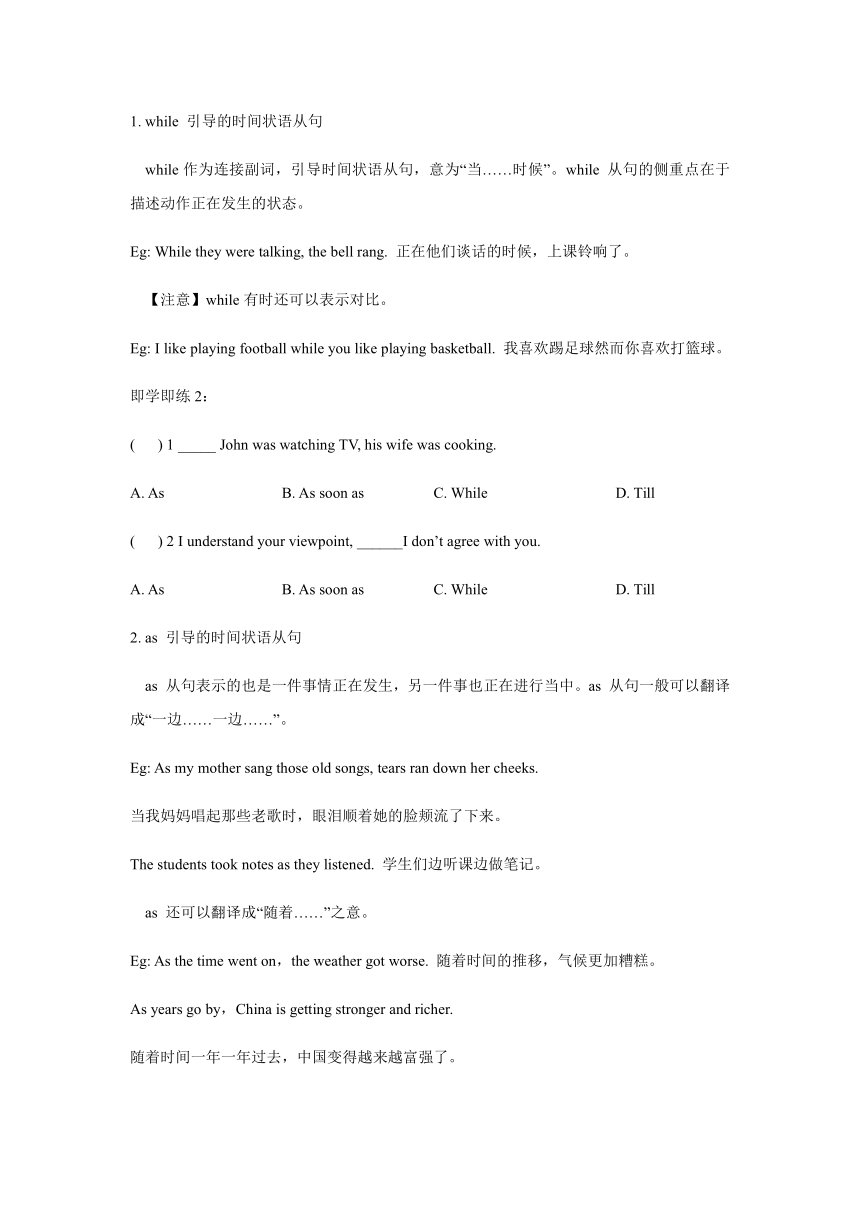
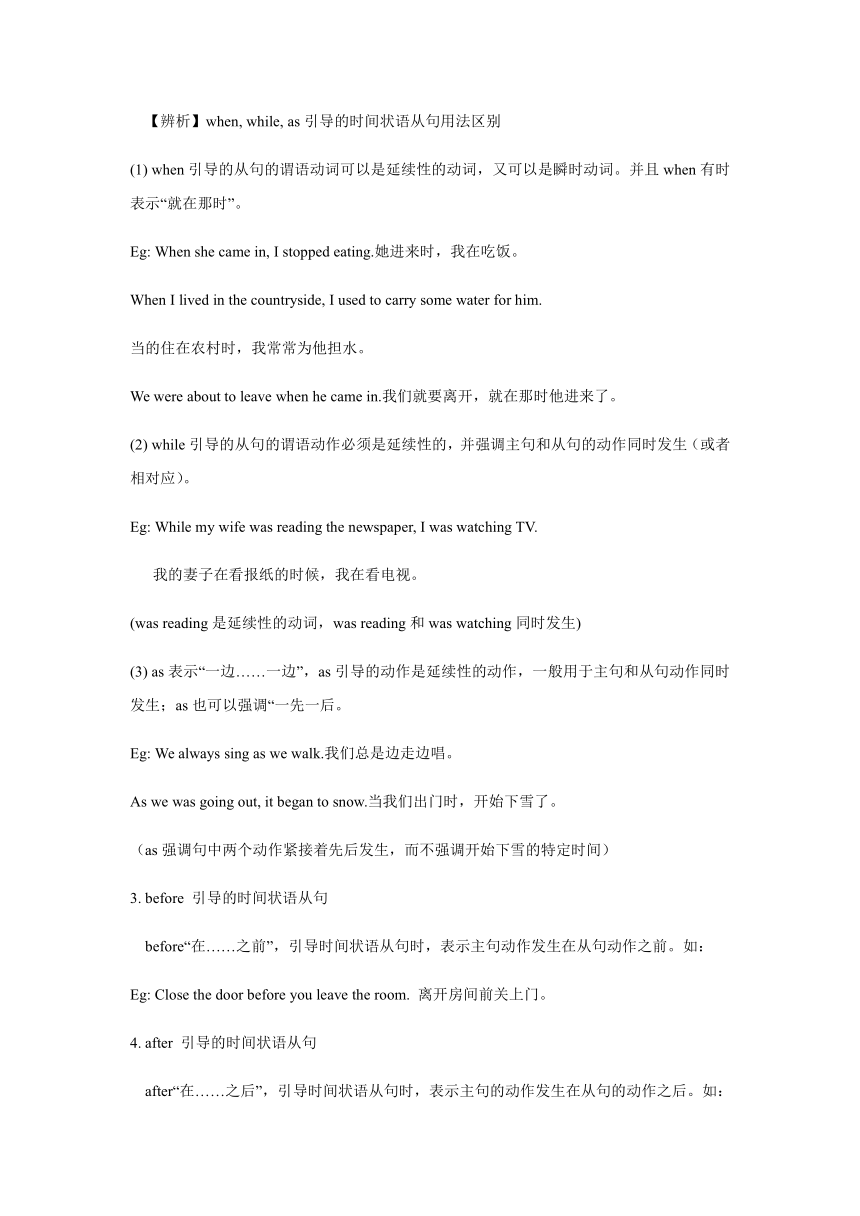
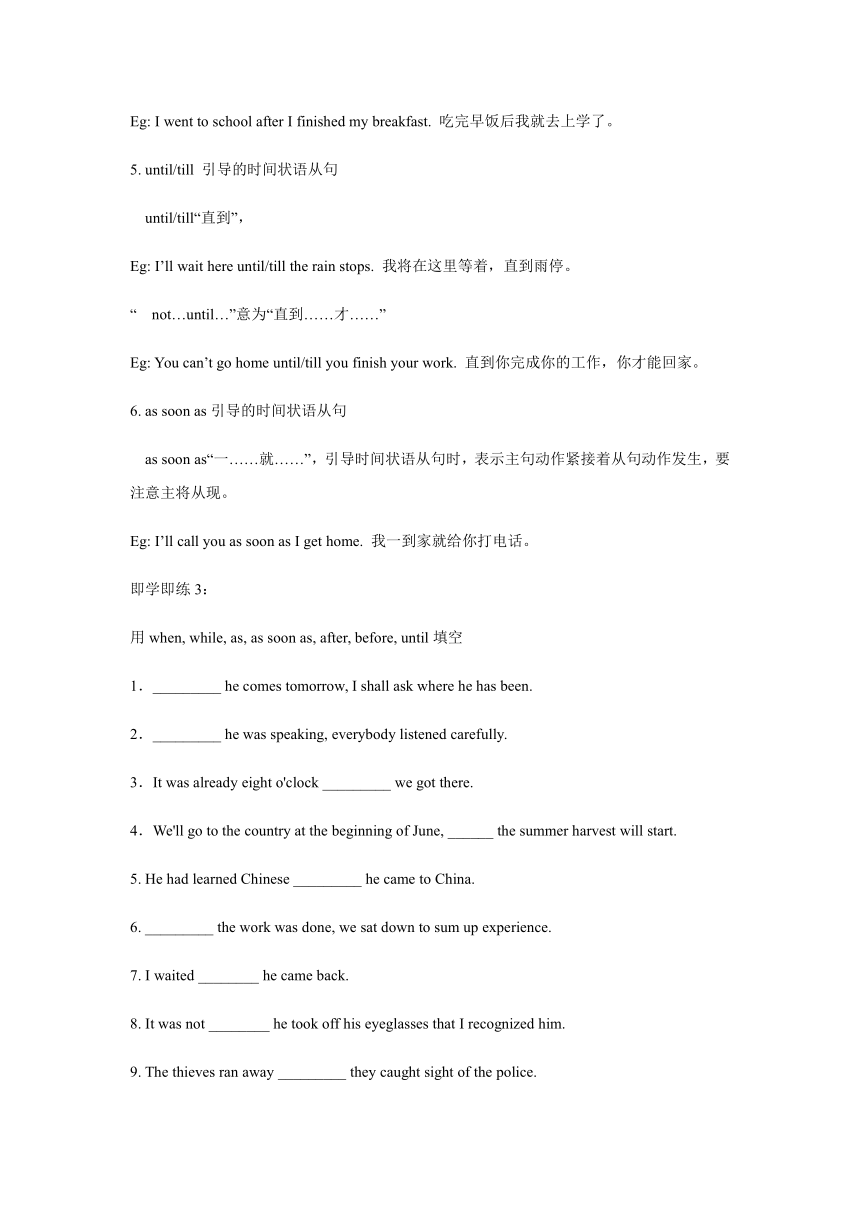
文档简介
初一英语同步学案UNIT8:when引导的时间状语从句&used to用法
Warm-up: Reading
Jim and Mary were both patients in a Mental Hospital. One day while they were walking by the hospital swimming pool, Jim suddenly jumped into the deep end. He sank to the bottom. Mary promptly jumped in to save him. She swam to the bottom and pulled Jim out.
When the medical director became aware of Mary's heroic act he immediately reviewed her file and called her into his office. "Mary, I have good news and bad news. The good news is you're being discharged because since you were able to jump in and save the life of another patient, I think you've regained your senses. The bad news is Jim, the patient you saved, hung himself with his bathrobe belt in the bathroom, he's dead." Mary replied, "He didn't hang himself, I hung him up to dry."
Adverbial clauses of time 时间状语从句
【重难点】
1. 了解由when, while, as soon as, before, after, until, as引导的时间状语从句。
2. 掌握when引导的时间状语从句
3. 掌握used to do/did not use to do用法
【精讲点拨】
一、时间状语从句定义
?在复合句中,由时间连接词引导的状语从句叫做时间状语从句。
?时间状语从句的连接词主要有:when, while, as soon as, before, after, until, as.
二、when引导的时间状语从句
?when作为连接副词,引导时间状语从句,意为“当……时候”。当when从句放在前面时,从句后常用逗号。
Eg: When I was young, I often swam in the river. 我年轻时,常在这条河里游泳。
It gets warmer and warmer when spring comes. 春天到了,天气越来越温暖。
即学即练1:
( )1 ______ someone catches a big fish, everyone gets ______.
A. When; exciting B. Before; exciting C. When; excited D. Before; excited
( )2 Grandma fell asleep ______ she was listening to the music.
A. after B. before C. when D.if
巩固练习(一)
完成句子
1. 当我们来到的时候,天黑了。
The sky ______ ______ ______ when we arrived.
2. 当他病的时候,他不上学。
He doesn’t go to school ______ ______ ______ ______.
3. 当你去探望朋友时,带上一份礼物。
______ ______ ______ ______ you ______ you ______ a friend.
4. 你有疑问时,可以来问我。
______ you have questions, you can come and ______ me.
5. 在我小的时候,我常常看天上的星星。
______ ______ ______ ______, I used to look at the stars in the sky.
三、知识拓展
1. while 引导的时间状语从句
?while作为连接副词,引导时间状语从句,意为“当……时候”。while 从句的侧重点在于描述动作正在发生的状态。
Eg: While they were talking, the bell rang. 正在他们谈话的时候,上课铃响了。
?【注意】while有时还可以表示对比。
Eg: I like playing football while you like playing basketball. 我喜欢踢足球然而你喜欢打篮球。
即学即练2:
( ) 1 _____ John was watching TV, his wife was cooking.
A. As B. As soon as C. While D. Till
( ) 2 I understand your viewpoint, ______I don’t agree with you.
A. As B. As soon as C. While D. Till
2. as 引导的时间状语从句
?as 从句表示的也是一件事情正在发生,另一件事也正在进行当中。as 从句一般可以翻译成“一边……一边……”。
Eg: As my mother sang those old songs, tears ran down her cheeks.
当我妈妈唱起那些老歌时,眼泪顺着她的脸颊流了下来。
The students took notes as they listened. 学生们边听课边做笔记。
?as 还可以翻译成“随着……”之意。
Eg: As the time went on,the weather got worse. 随着时间的推移,气候更加糟糕。
As years go by,China is getting stronger and richer.
随着时间一年一年过去,中国变得越来越富强了。
?【辨析】when, while, as引导的时间状语从句用法区别
(1) when引导的从句的谓语动词可以是延续性的动词,又可以是瞬时动词。并且when有时表示“就在那时”。
Eg: When she came in, I stopped eating.她进来时,我在吃饭。
When I lived in the countryside, I used to carry some water for him.
当的住在农村时,我常常为他担水。
We were about to leave when he came in.我们就要离开,就在那时他进来了。
(2) while引导的从句的谓语动作必须是延续性的,并强调主句和从句的动作同时发生(或者相对应)。
Eg: While my wife was reading the newspaper, I was watching TV.
我的妻子在看报纸的时候,我在看电视。
(was reading是延续性的动词,was reading和was watching同时发生)
(3) as表示“一边……一边”,as引导的动作是延续性的动作,一般用于主句和从句动作同时发生;as也可以强调“一先一后。
Eg: We always sing as we walk.我们总是边走边唱。
As we was going out, it began to snow.当我们出门时,开始下雪了。
(as强调句中两个动作紧接着先后发生,而不强调开始下雪的特定时间)
3. before 引导的时间状语从句
?before“在……之前”,引导时间状语从句时,表示主句动作发生在从句动作之前。如:
Eg: Close the door before you leave the room. 离开房间前关上门。
4. after 引导的时间状语从句
?after“在……之后”,引导时间状语从句时,表示主句的动作发生在从句的动作之后。如:
Eg: I went to school after I finished my breakfast. 吃完早饭后我就去上学了。
5. until/till 引导的时间状语从句
?until/till“直到”,
Eg: I’ll wait here until/till the rain stops. 我将在这里等着,直到雨停。
?“not…until…”意为“直到……才……”
Eg: You can’t go home until/till you finish your work. 直到你完成你的工作,你才能回家。
6. as soon as引导的时间状语从句
?as soon as“一……就……”,引导时间状语从句时,表示主句动作紧接着从句动作发生,要注意主将从现。
Eg: I’ll call you as soon as I get home. 我一到家就给你打电话。
即学即练3:
用when, while, as, as soon as, after, before, until填空
1._________ he comes tomorrow, I shall ask where he has been.
2._________ he was speaking, everybody listened carefully.
3.It was already eight o'clock _________ we got there.
4.We'll go to the country at the beginning of June, ______ the summer harvest will start.
5. He had learned Chinese _________ he came to China.
6. _________ the work was done, we sat down to sum up experience.
7. I waited ________ he came back.
8. It was not ________ he took off his eyeglasses that I recognized him.
9. The thieves ran away _________ they caught sight of the police.
10. They decided to go back home _________ their money ran out.
11. __________ I get to the airport, I will phone you to pick me up.
12. They were about to leave ______ it began to rain.
13. He always stay in bed ______ lunch time.
14. I like playing tennis _________ my younger sister prefers watching ball games.
15. _______ she grew older, she became more responsible.
四、used to do/did not use to do用法
?used to 表示过去的习惯动作或行为,含有较强的“今昔对比”的意味,表示过去总是这样,现在不是这样了。其中的to是不定式符号,后接动词原形。
Eg: People used to think that the sun went round the earth.
以前人们总是认为太阳是围绕地球转的。(表示现在不这样认为了)
When he was young, he used to be poor.
他年轻时,总是很穷。(表示现在不穷了)
?used to 的否定形式常用didn’t use to。
Eg: He didn’t use to have any money when he was a boy. 他小时候常常没有钱。
?【拓展】 be/get used to sth./doing sth.. 习惯于……
be used to do 被用来做……
Eg: I'm used to drinking a cup of water after meal. 我习惯饭后喝一杯水。
This machine is used to clean the wall. 这种机器被用来打扫墙壁。
即学即练4:
1)用所给词组的适当形式填空
used to do…… be/get used to doing…… be used to do
1. Life here is much easier than it ____________ be.
2. He ______________ hard work.
3. I’ve lived in Paris for six years now, so I’m quite _________ the traffic.
4. It’s difficult to understand Scottish people if you______________ their accent.
5. It was a bit of a shock: I___________________ paying so much for a sandwich and a glass of beer.
6. I don’t play tennis much these days, but I ____________.
7. The wood ______________ make desks and chairs.
2)用所给动词的适当形式填空
1. You’ll soon get used to ___________(live) in the country.
2. I never used to ___________(eat) cakes, but I eat a lot now.
3. When I was younger I was used to ____________(walk) long distances.
4. I used to ___________(go) swimming on Saturdays.
5. Didn’t she use to ____________(live) in Germany?
3)句子翻译
1.几个月后他就习惯了一个人生活了。
_________________________________________________________
2.我过去一直住在伦敦。 __________________________________________________________
3.刀是用来切东西的。
__________________________________________________________
巩固练习(二)
( ) 1 When my parents were young, they ____ have any money.
A. don’t use to B. didn’t use
C. didn’t use to D. don’t use
( ) 2 He ____ to school on foot.
A. use to go B. used to went C. used to go D. use to going
( ) 3 I always ____ try to stay awake on Christmas Eve ____ I was a little boy.
A. use to; when B. used to; when
C. used to; before D. use to; before
( ) 4 I ____ swim in the river, but I don’t ____.
A. used to; any longer B. use to; any longer
C. used to; any long D. use to; any long
( ) 5 ____ you ____ go to work by bus?
A. Did; use to B. Did; use C. Do; use to D. Do; used
【巩固提升】
一、基础练习
( )1. It was quiet ________ those big trucks started coming through the town.
A. before B. after C. until D. unless
( )2. It seemed only seconds ________ the boy finished washing his face.
A. when B. before C. after D. even if
( )3. I can hardly recognize you ________ I saw you at the airport.
A the moment B. while C. after D. once
( )4. He was about to go to bed ________ the doorbell rang.
A. while B. as C. before D. when
( )5. _____ John was watching TV, his wife was cooking.
A. As B. As soon as C. While D. Till
( )6. The children ran away from the orchard(果园) ______ they saw the guard.
A when B. after C. before D. as
( )7. I will send you an e-mail ______ I arrive in the country.
A. before B. while C. because D. as soon as
( )8. ______ they finished their homework,they played football on the playground .
A. Before B. After C. While D. As
( )9.I ____get up early .
A. use to B. used to C. am used to D. was used to
( )10. Where _____ live before you came here?
A. did you used to B. did you use to C. use he to D. he used
( )11. There ________ a lot of red-crowned cranes in this area.
A. was used to B. was used to be C. used to D. used to be
( )12. She used to ______ with her parents, but now she is used to ______ with her classmates at school.
A. live; living B. live ; live C. living; living D. living; live
( )13. He used to ____ in a small village, but now he has been used to ___ in the big city.
A. live; living B. live; live C. living; living D. living; live
( )14. Miss Green _______ go to hospital, but now she is in good health.
A. has to B. need to C. used to D. ought to
( )15.___________ study in No.4 Middle School?
A. Did you used to B. Did you use to C. Do you used to D. Do you use to
二、中考链接
( )1. Peter likes reading a newspaper he is having breakfast.
A. until B. while C. because D. though
( )2. Many students didn’t realize the importance of study _____ they left school.
A. when B. until C. as D. after
( )3. You should go over your test paper _____ you hand it in . (2010.衢州中考)
A. before B. though C. because D. as soon as
( )4. Scientists say it may be a few years ______it is possible to test the new medicine on patients.
A. because B. after C. before D. since
( )5. It’s quite common in Britain to say “Thank you” to the drivers __________people get off the bus. (2009·河南中考)
A. after B. since C. until D. when
( )6. —Where was your brother at this time last night?
—He was writing an e-mail _______ I was watching TV at home.
A. as soon as B. after C. until D. while
( )7. He will come here right away ________ he hears the news.
A. so B. as soon as C. because D. though
( )8. Tim will call me as soon as he my package.
A. receive B. will receive C. received D. receives
( )9. Newton was playing under an apple tree ______ an apple fell onto his head.
A. when B. while C. after D. before
( )10. He’ll send us a message as soon as he ________ in Sichuan.
A. is arriving B. will arrive C. arrived D. arrives
( )11 Uncle Liu ______ a worker and he is seventy now.
A. uses to B. used to C. used to be D. was used to
( )12. The old man ______ walk in the park every morning. But now he rides a bike instead of walking.
A. used to B. was used to C. is used to D. used to be
【课后拓展】
一 语言知识与运用( 共两节,满分20分)
第一节:单项选择(共10小题;每小题1分,满分10分)
从11-20各题所给的A、B、C和D项中,选出可以填入空白处的最佳选项。
( )1. He looks____ his mother
A. the same B. like C. on D. to
( )2. Please ____ there
A. go to B. to go C. come D. go
( )3. Here’s your coat, please ____
A. put it on B. put on it C. put on them D. put them on
( )4. Look, here ____ Lily’s father and mother
A. is B. are C. be D. am
( )5. Beijing ____ cloudy tomorrow
A. will be B. is C. was D. are
( )6. There are ____ trees in the forest
A. three billion of B. billions of C. three billion of D. three billions
( )7. I ____ with my cousins when I was a little boy
A. used to play B. was used to play
C. used to playing D. use to play
( )8. It’s easy for you ____ English in this way
A. learning English B. learn English C. to learn English D. to learning English
( )9.We were ____ about the ____ films
A. excited; excited B. exciting; exciting
C. exciting; excited D. excited; exciting
( )10. –Where’s Marry?
-- I saw her ____ the street just now
A. crossed B. cross C. crosses D. to cross
第二节:语法选择(共10小题:每小题1分,满分10分)
阅读短文,按照句子结构的语法性和上下文连贯的要求,从各题所给的A、B、C和D项中选出最佳选项。
Wang Xin and Deming are going to the bookshop. 11 the way to the book shop, they meet 12 old women. She is standing at the bus stop. She 13 very worried. There is a small trunk(箱子)beside 14 .
"What's the matter, old lady?" Wang Xin asks.
I want to go and see my daughter. I come here for the _ 15 _ time. My daughter says she'll __16__ me here. But I can't find her. __ 17__ shall I do?" the old lady answers.
"Do you 18 the address of your daughter?" Deming asks.
"_ 19 ." she gives a piece of paper to Deming.
Deming 20 the address and says, "Don’t worry. We can help you get there."
"It’s very nice of you." says the old lady.
( )11. A. in B. on C. at D. by
( )12. A. a B. the C. / D. an
( )13. A. looks B. look C. is looking D. looked
( )14. A. she B. herself C. her D. hers
( )15. A. one B. only C. first D. last
( )16. A. met B. meet C. meeting D. to meet
( )17. A. What B. How C. When D. Where
( )18. A. having B. has C. to have D. have
( )19. A. It's here B. Here it is C. Here they are D. Give you
( )20. A. is reading B. reads C. will read D. read
三、完形填空(共10小题:每小题1分,满分10分)
阅读短文,掌握其大意,从各题所给的A、B、C和D项中选出最佳选项。
Linda got up late this morning. She was late __21__ work, and she had to hurry to the airport to meet ___22__ friend. She __23___ time for cooking. Actually, she didn’t even have time for supper. What could she do? But she didn’t need to __24__ that. She drove to the McDonald’s and the McDonald’s helped her. It is a good place for __25__ food. There are a lot of McDonald’s in the United States. You can find them in both big cities and small towns. Those restaurants all have golden arches (拱形棚) on top, which__26___ a big letter “M”, and you can find them __27__.
They have different kinds of drinks and food there, too. The service is quick. Just pay at the cash desk and you can get your __28__ at once. If you don’t need to __29__, you can sit there and enjoy your meal. If not, just stop your car __30__ a window, pay for your food and take it away. You can have your meal in your car.
( )21. A. for B. to C. from D. before
( )22. A. his B. their C. our D. her
( )23. A. doesn’t’ have B. didn’t have C. has D. had
( )24. A. worry B. be worried C. worry about D. worried about
( )25. A. healthy B. delicious C. fast D. quick
( )26. A. look like B. look at C. look for D. look after
( )27. A. easy B. easily C. later on D. in a hurry
( )28. A. meal B. drink C. fruit D. seafood
( )29. A. work B. drive C. go D. hurry
( )30. A. for B. behind C. in front of D. in the front of
四 阅读理解(共20小题:每小题2分,满分40分)
A
There was a man named Ben. He made caps to make money. One day he went to sell his caps. He went through a forest. There were many monkeys in it. It was very hot and Ben wanted to have a rest. He came up to a large tree, put his caps on the ground, took one of them and put it on his head. Then he lay down and soon fell asleep.
“Where are my caps?” Ben cried when he woke up. He looked up and saw many monkeys in the trees. Each monkey had a cap on its head.
“Give me back my caps!” Ben shouted at the monkeys. But the monkeys couldn’t understand him. Ben got very angry. He took off his own cap, threw it on the ground and cried, “If you want all my caps, you may take this one, too!”
What do you think happened then? The monkeys did the same. Each monkey took off its cap and threw it on the ground. Ben was very glad. He quickly collected all his caps and went on with his way.
( )31. It was so hot that Ben wanted to ____.
A. have a rest B. sell his caps in the forest
C. have a drink D. return home at once
( )32. Ben ____, lay down and fell asleep soon.
A. put all his caps on his head B. put one of his caps on the ground
C. put all his caps in the tree D. put one of his caps on his head
( )33. When Ben woke up, he found ____.
A. some monkeys were taking away his caps
B. each monkey had a cap on its head
C. the monkeys were laughing at him
D. a monkey was taking away his caps
( )34. Ben told the monkeys ____.
A. to buy his caps B. not to take away his caps
C. to return his caps D. not to laugh at him
( )35. At last the monkeys threw the caps on the ground because ____.
A. they felt sorry
B. the man got angry
C. they didn’t like the caps any more
D. they liked to do the same things as men
B
Mr Brown was in trouble recently. He drove a car for Mr Jackson. He worked hard, but he couldn’t work when he drank too much. And once he almost drove into the river after he drank. Mr Jackson was very angry and was going to fire (解聘) him. He was afraid of that and said he would stop drinking. Mr Jackson told him to wait for work.
On Friday morning Mr Brown came into the office with two badly hurt ears. “What happened to your ears?” asked Mr Jackson. “Well,” said Mr Brown, “I was watching a football match yesterday while my wife was ironing clothes. She had put the iron (熨斗) near the telephone before she cooked supper. Our team lost the game and I felt sorry about it. As soon as I went into the sitting-room, the phone rang and I answered the iron!”
“And what happened to the other ear?”
“When I put the iron down on the table, the telephone rang again!”
( )36. Why did Mr Brown almost drive the car into the river?
A. Because he was careless.
B. Because he drank too much.
C. Because he forgot they were on the bridge.
D. Because he couldn’t work in the evening.
( )37. When did Mr Brown watch the football match?
A. On Monday. B. On Tuesday. C. On Thursday. D. On Saturday.
( )38. We can guess ____.
A. Mr Brown watched the match at work
B. Mr Brown was angry with his team
C. Mr Brown didn’t drink those days
D. Mr Brown drank too much while watching the match
( )39. ____ badly hurt Mr Brown’s ears.
A. The telephone B. The drinking C. The iron D. The car
( )40. What would happen to Mr Brown?
A. Mr Jackson would send him away.
B. He would join his football team.
C. He would never watch any matches.
D. He would go on driving for Mr Jackson.
C
Mr Green lives in a big city. But he likes fishing very much. It is his favorite sport. He always goes to the river near the city. He often fishes for many hours without catching anything. But he doesn’t worry about it. Some fishermen can’t catch fish, too. But sometimes they can catch some old boots and rubbish. Mr Green is even worse than the fishermen. He never catches anything—not even old boots or rubbish. After he spends the whole morning on the river, he always goes home with an empty bag. But he still keeps fishing every day. One day, he met one of his friends. His friend said, “You must give up fishing! It is a waste of time.” Mr Green smiled, “But you don’t understand one important thing. I am not really interested in fishing. I am only interested in sitting in a boat and doing nothing at all. It can make me forget the noise of the city and live quietly for some time.”
( )41. Mr Green always goes fishing because ____.
A. he can sell the fish and get some money
B. he thinks it is a good sport
C. he can cook the fish for supper
D. he likes eating fish
( )42. Mr Green likes to fish ____ .
A. in a boat on the river B. by the river
C. in the river D. with the fishermen
( )43. He always goes home with an empty bag because ____.
A. he can’t fish at all
B. he always gives the fish to other fishermen
C. there isn’t any fish in the river
D. he doesn’t pay attention to fishing at all
( )44. His friend told him ____ when his friend knew he couldn’t catch anything.
A. to learn how to fish B. to change the way of fishing
C. not to fish any more D. to buy fish to eat
( )45. From the story we know Mr Green ____.
A. lives in the country B. is a good fisherman
C. is interested in fishing D. doesn’t like the noise of the city
D
Jay Chou is very famous in Southeast Asia. His songs are very popular among teenagers.
Jay Chou was born in January, 1979 in Taiwan. His mother was a teacher in a middle school. His parents divorced (离婚) when he was 14. He lived with his mother. His mother was very strict with him and hoped he could have a good future.
When Jay Chou was three years old, his mother found he was good at music. She bought a piano for her son. So Jay Chou began to practise the piano after school every day. When he was in school, he often liked to be alone listening to music. Soon he became interested in pop music and began to write songs.
In 1996, he worked as a waiter after he graduated from school. Four years later, he issued (发布) his first album called Jay. He began to become very famous and put his heart into music. On June 30th, 2009, Jay Chou attended the large concert “The Charm of China” in the Bird’s Nest Stadium.
( )46. Jay Chou was born in ____.
A. Beijing B. Hong Kong C. Taiwan D. Macau
( )47. Jay Chou’s mother worked in a ____.
A. hospital B. school C. factory D. bank
( )48. Why did Jay Chou’s mother buy him a piano?
A. Because he asked his mother to buy it.
B. Because his father asked her to do so.
C. Because he liked playing the piano.
D. Because his mother found he was good at music.
( )49. When did Jay Chou issue his first album?
A. In 1996. B. In 1998. C. In 1999. D. In 2000.
( )50. From this passage, we know Jay Chou____.
A. attended a concert in Bird’s Nest on June 30th, 2009
B. didn’t like music when he was in school
C. lived with his parents when he was 18
D. didn’t like music at the age of three
五、写作(满分30分)
第一节 单词拼写(共5小题,每小题1分,满分5分)
根据下列句子及所给单词的首字母写出所缺单词。在填写答卷时,要求写出完整单词。(每空只写一词)
51. K_________ is important to all of us.
52. If you want to keep l_______, you should do sports every day and try not to stay up late.
53. The hot weather will l________ until September.
54. What do you want to be in the f_________?
55. Do you want to go s_________ this week?
第二节 完成句子(共5小题,每小题2分,满分10分)
根据所给的汉语内容,用英语完成下列句子。(每空只写一词)
56. 他每天上午都去商店买东西。
He _______ _______ go shopping every morning.
57. 这些照片是在同一个地点不同季节拍摄的。
These pictures are of the ______ place but taken in ______ seasons.
58. 杰克非常满意自己的新车。
Jack is very ________ _______ his new car.
59. 我希望我能把我的兴趣变成我的事业。
I hope I can ________ my _______ _______ my career.
60. 只要我们尽力,我们就能实现我们的梦想。
We can ______ ______ ______ as long as we try our best.
第三节 书面表达(共1小题,满分15分)
假如李明是你的好朋友,根据提示写一篇80词左右的短文介绍李明的业余爱好。(短文开头已给出)
提示语:
1.李明以前是个电影迷, 一周至少去看两次电影,有时租VCD在家里看,最喜欢的影星是姜文;
2.李明现在的兴趣是集邮, 认为集邮非常有趣,可以从邮票上学到很多关于人物、地点、历史的知识, 有些旧邮票非常有价值;
3.上周五是李明的生日, 他从朋友那里得到了许多邮票,非常高兴。
Li Ming is my good friend. He has many hobbies. _____________________________________________________________________
____________________________________________________________________________________________________________________________________________________________________________________________________________________________________________________________________________________
答案
即学即练1:
1. C 2. C
即学即练2:
1.C 2. C
即学即练3:
1. When 2. While / When 3. when 4. when 5. before
6. After 7. till/until 8. until1 9. as soon as 10. before
11. As soon as 12.when 13. until 14. while 15. As
即学即练4:
1)用所给词组的适当形式填空
1. used to 2. is used to 3. used to 4. are not used to 5. was not used to
6. used to 7. is used to
2)用所给动词的适当形式填空
1. living 2. eat 3. walking 4. go 5. live
3)句子翻译
1. He was used to living alone several month later.
2. I used to live in London.
3. The knife is used to cut things.
巩固练习(一)
1. went dark when
2. when he is ill/sick
3. Take a present with; see/visit
4. When; ask
5. When I was young
巩固练习(二)
1 C 2. C 3. B 4. A 5. A
【巩固提升】
基础练习:
1-5: CBADC 6-10ADBBB 11-15DAACB
中考链接:
1-5 BBACD 6-10DBDAD 11-12CA
【课后拓展】
单项选择
1-5 BDABA 6-10 BACDB
语法选择
11-15 BDACC 16-20 BADBB
完形填空
21-25 ADBCC 26-30ABADC
阅读理解
31-35 ADBCD 36-40 BCDCA
41-45 BADCD 46-50 CBDDA
单词拼写
51. Knowledge 52. lively 53. last 54. future 55. sailing
完成句子
56. used to 57. same; different 58. proud of
59. turn; hobby into 60. achieve our dreams
书面表达
Li Ming is my good friend. He has many hobbies. He used to be a movie fan. He went to the movie theater at least twice a week. Sometimes he rented VCDs and watched them at home. His favorite movie star was Jiang Wen.
Now Li Ming is interested in collecting stamps. He thinks it’s great fun. He can learn a lot about people, places, history and many other things from stamps. Some old stamps are very valuable.
Last Friday was Li Ming’s birthday. He got many stamps from his friends. Li Ming was very happy.
